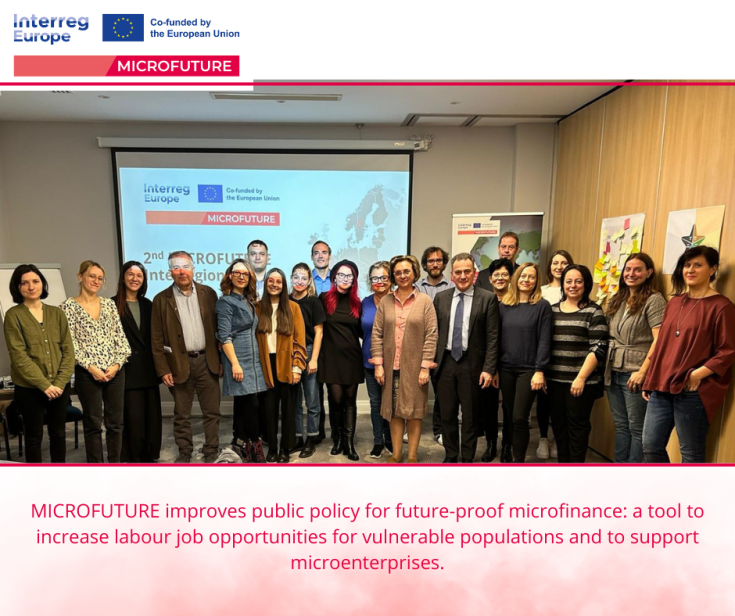MICROFUTURE PARTNERS GATHER IN ROMANIA FOR THE 2ND MEETING
The event took place on November 7-8, 2023, at the Hilton Garden Inn Bucharest Old Town. The partners from Romania, Italy, Slovenia, Sweden, and France took part in the event, bringing together representatives from both the public and private sectors. This marked a significant milestone in the evolution of the MICROFUTURE - Future proof microfinance for social inclusion project.
Important guests at the event included Mr. Vladimir Rovințescu, Head of the Management Authority for European Programs Human Capital, and Mr. Silviu Ancuța, Head of the Regional Intermediate Body Bucharest-Ilfov. Their presence emphasized the importance and support for initiatives in the field of microfinance and social entrepreneurship within the social economy.
The event commenced with presentations focusing on the connection between microfinance and social entrepreneurship, addressing relevant themes in the fields of microfinance and social economy. The session's moderator, Giuseppe Torluccio from the Yunus Foundation Italy, led presentations by Andi Duqi from the University of Bologna, Laura David from BCR Social Finance IFN, Francesco Savoia from the Università degli Studi di Milano Statale, and Micaela Mazzei from the University of Glasgow.
The second part of the event included case study presentations from Romania, featuring Angela Achiței from "Closet o you" Romania Foundation, Felicia Relenschi from AFIN and Raluca Prelucă from National Centre for Competences in Social Innovation Romania, who shared their experiences in the field of microfinance and social entrepreneurship.
The first day concluded with group discussions and presentations of the territorial analysis for partner countries. A comparative overview of the MICROFUTURE territorial map highlighted the diversity and complexity of this field in the European context.
After an energetic opening and insightful discussions, the second day of the Interregional Event promised to be equally captivating and content-rich. Following a brief review of the discussions and conclusions from the first day, emphasizing the key points discussed, participants were invited to share their experiences and contribute to shaping the future of the microfinance system in a workshop launched and moderated by the exchange team.
"Gap analysis," provided participants with the opportunity to analyze and identify essential elements of a "resilient microfinance system for the future" in each territory.
Partners discussed the significance of the term "future-proof" and worked together to on shaping the format of deficiency analysis (reviewing weaknesses in microfinance provision through a "future-proof" lens).
The importance of the link between this effort and the process of improving public policy was emphasized (i.e., identifying deficiencies that can find solutions from Good Practices provided by other partners).
Group discussion sessions and conclusions from exchange sessions were highlighted.
The closing session brought forward the conclusions and next steps of the MICROFUTURE project. Through outstanding presentations, interactive discussions, and detailed territorial analysis, participants explored the link between microfinance and social entrepreneurship, identified deficiencies and contributed to shaping the future of a "resilient microfinance system."
The workshop launch of "Gap analysis" was a significant moment, offering participants the opportunity to analyze and identify essential elements of a future-oriented microfinance system in each territory. Partners actively collaborated in shaping the format of deficiency analysis, emphasizing the significance of the term "future-proof" in the context of each territory and focusing on collaboration to identify and implement Good Practices.
The closing session highlighted the conclusions and next steps of the "MICROFUTURE" project, underscoring the importance of defining and co-creating the agenda for future interregional events. Participants demonstrated a strong commitment to the project's objectives and were encouraged to continue making significant contributions to shaping its strategic direction.
The event was marked by intense dialogue and constructive collaboration, confirming the partners' determination to strengthen partnerships, bring together experts and practitioners in the field of microfinance and social economy, and facilitate knowledge exchange to promote innovation and best practices for sustainable and inclusive development.
The "MICROFUTURE - Future proof microfinance for social inclusion" project continues to be a catalyst for strengthening collaboration and promoting a sustainable approach in the field of microfinance, contributing to building a more inclusive society.

